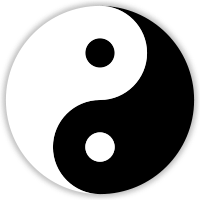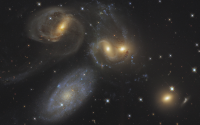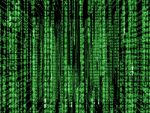Big Bang? Let there be Light?

In an earlier post, I wrote that:
Ultimately both represent ways of looking at the universe. There is no factual conclusion, no proof, about either one; both are matters of faith and belief. Science can argue all it wants that the Logic and Scientific Method is superior to believing in an ineffable reality, but given all we do know and all we don't know, in the end it is still just a worldview.
Make no mistake. I am far more a scientist than a theist. (And to the extent I'm a theist, I'm far more a deist than theist, which means I can accept the idea of a Creator (or Creators), but I'm not too sure about the Presence of a Daily Hand. Specifically, I very much doubt that prayer is other than a form of personal meditation; I very much doubt Anyone is Listening.)
I do think Logic and the Scientific Method are far superior…
For some things. For many things. For many, many things.

But not for every thing.
It is a Yin to the Yang of what for now let's just call meta-reality.
That science clearly works is amply demonstrated in everything from ships to radio to HD TV to robots on Mars. Math, a big part of science and logic, clearly also works (for many things, but not every thing).
Math describes so many aspects of life so well that it's spooky. It forces the Plato and Aristotle distinction: Does math make reality; or did we just invent it so it describes reality.

Math is funny due to infinity (as in counting to) and infinite things (like how the digits of pi go on forever). The idea of an infinite collection of things, like hotel rooms, creates paradoxes, which suggests math is made up. And the simple ratio between a circle's radius and rim creates a magic number that no math formula completely describes.
And yet, various maths do describe how reality behaves in eerily accurate fashion. The behavior of light, the path of a cannon ball, waves on the water; math describes them wonderfully well. Math is fascinating and cool, but I'll leave that for another article.

The more I learn about the physics behind the Big Bang, the more it sounds just as fantastic as, "Let there be Light." Or whatever world-creation myth or universe theory you prefer. They all sound equally preposterous and equally fantastic to me. An age-old philosophical conundrum, "Brain in a Jar," points out that it's almost impossible to tell if this is the Matrix, Memorex or Reality.
It may sound preposterous that the universe was created as a conscious act of some kind by an incredibly powerful mind, but consider exactly what the Big Bang is.

Quantum physics has a well-established principle, called the Heisenberg Uncertainty Principle. It's a law of physics, and it says that the more you narrow down certain aspects of reality, the more other aspects become not narrowed down. In fact, when you really crank on the narrowing down of one, the other property jumps all over the place. Seriously all over the place.
Two of these see-saw properties are space and energy. The more you narrow down space to a point, the more the energy value of that point jumps all over the place. If you narrow space down to a nearly infinitesimally small point, the energy can vary so much that it is statistically possible for it to be enough to make a Big Bang.

In this view, everything — you, the city around you, the earth, the sun, all the stars, all the galaxies, everything — is the result of a (wildly improbable, but possible) energy fluctuation of an infinitely small point. Einstein taught us that energy and matter are but two sides of one coin, so where you have a huge amount of energy, you can have a huge amount of matter. A whole universe of matter.
A question that occurs to me is that, against what background did this take place? If spacetime was created by the Big Bang, if our laws of physics were created by the Big Bang, by what laws of physics, and in what environment, did the Big Bang occur? If the Heisenberg Uncertainty Principle applies to physics in our spacetime, does it equally apply to the non-spacetime before the Bang?

So take your pick. Math simulation, Matrix machines, created by God(s), quantum fluctuation, turtles all the way down. They're all preposterous; they're all fantastic.
Believe anything that suits you, that seems right, but be honest that it might be something else. No matter what you think it is; it might be something else.
Good general principle in life, actually.
- WordPress Post (published July 31, 2011)